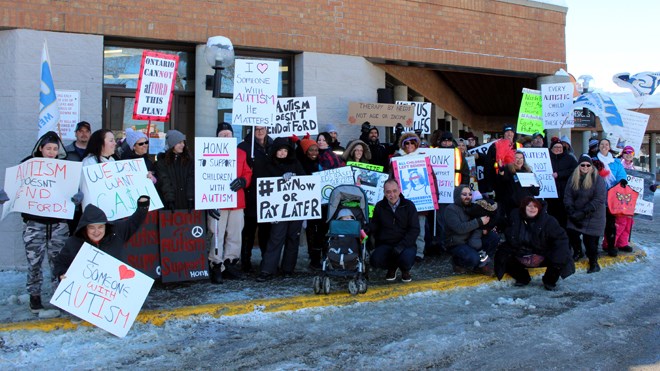The Ontario government is providing additional supports for families of children on the autism spectrum, the government announced today.
Starting in March, the province will begin offering core clinical services based on a child's individual needs, a key element of the new Ontario Autism Program. These services include applied behaviour analysis, speech language pathology, occupational therapy and mental health supports.
The government will also be offering an additional extension of funding to purchase eligible services and supports parents feel are most appropriate for their children as the province continues to implement a needs-based autism program.
“Providing core clinical services is a critical step forward in the development of a needs-based autism program designed by the community for the community” said Todd Smith, minister of Children, Community and Social Services, in a news release. “We are determined to get this right so more children than ever before can receive the appropriate level of support they need close to home.”
The ministry has asked the Child and Parent Resource Institute to oversee the launch of core clinical services.
Beginning this month, care coordinators will be trained to conduct and guide families through the new determination of needs process that will include:
- Meeting with a family to identify a child's goals, strengths and support needs across key domains
- Allocating funding to families so they can purchase core clinical services from providers of their choice
- Supporting families with next steps to access core clinical services of their choice
Starting in March, about 600 children and youth from across the province who are registered in the Ontario Autism Program will be invited to participate in the launch of core clinical services.
Once families have received their funding allocation, they will then work directly with a clinician of their choice to develop treatment options and plans for their child. The feedback from families on their experience will be critical in helping the province evaluate and refine delivery of the program.
Guided by a standardized tool, a care co-ordinator will ask the family a series of questions to understand the child's or youth's goals and strengths, as well as their support needs across nine “domains”: communication, social interaction, play and leisure, activities of daily living, motor skills, cognitive skills, sensory system, interfering behaviours and mental health.
In addition to the nine domains, the care coordinator will consider factors such as developmental and life stages, as well as co-existing health and environmental factors.
This process is separate and distinct from the clinical assessment that would be completed by a clinician as a first step of treatment planning for core clinical services, the province said. Families will work directly with their chosen clinician(s) to develop treatment options and plans for their child.
Additionally, families can access:
- Renewal of interim funding: Eligible families who received a childhood budget or interim one-time funding will be offered additional payments of either $5,000 or $20,000, based on their child's age, to purchase eligible services and supports they feel are most appropriate for their child.
- Urgent response services: Initiating a community-based proposal process to identify organizations in the sector to deliver urgent response services. These services will provide a timely, rapid response to a specific, identified need to prevent further escalation.
- A $3.8-million additional investment in diagnostic hubs to improve families' access to an assessment for their child by reducing wait lists and wait times, resulting in families being able to register for the Ontario Autism Program and access services as quickly as possible.
- Increased oversight of clinicians providing applied behaviour analysis (ABA) therapy in Ontario. The government will introduce legislation to regulate ABA as a new profession under the College of Psychologists of Ontario, beginning with applied behaviour analysts in supervisory and assessment-focused roles.
Children and youth may be eligible to receive the following based on their identified support needs:
- Children aged 0-3 could receive from $10,900 to $65,000 yearly
- Children aged 4-9 could receive from $8,900 to $65,000 yearly
- Children aged 10-14 could receive from $7,600 to $41,400 yearly
- Youth aged 15-18 could receive from $6,600 to $31,900 yearly
- Additional funds for childhood budget and interim one-time funding recipients
Eligible families who received a childhood budget or interim one-time funding may be eligible to receive an additional payment of $5,000 or $20,000, based on their child's age.
Further details about eligibility and how to apply for the extension of funding will be shared in the coming weeks.
Families continue to have up to 18 months to spend their childhood budget or interim one-time funding and submit their expense forms.
Families with existing behaviour plans will continue to receive services up to the current level of intensity, or less as clinically appropriate, until their child or youth transitions into core clinical services in the needs-based program.
This year, the government will invest $3.8 million, in addition to $5.5 million in annual funding, for its five diagnostic hubs.
This additional investment will improve families' access to a diagnostic assessment for their child by reducing wait lists and wait times, the province said.
Previously, the government announced its intention to regulate providers who deliver applied behaviour analysis (ABA) therapy in Ontario to increase oversight and set standard expectations for quality therapy across the province.
The government intends to regulate ABA as a new profession under the College of Psychologists of Ontario, beginning with providers in supervisory and assessment-focused roles.
Next steps will include drafting proposed legislation that, if passed, would bring this change into effect, and working with the College to develop regulations.
